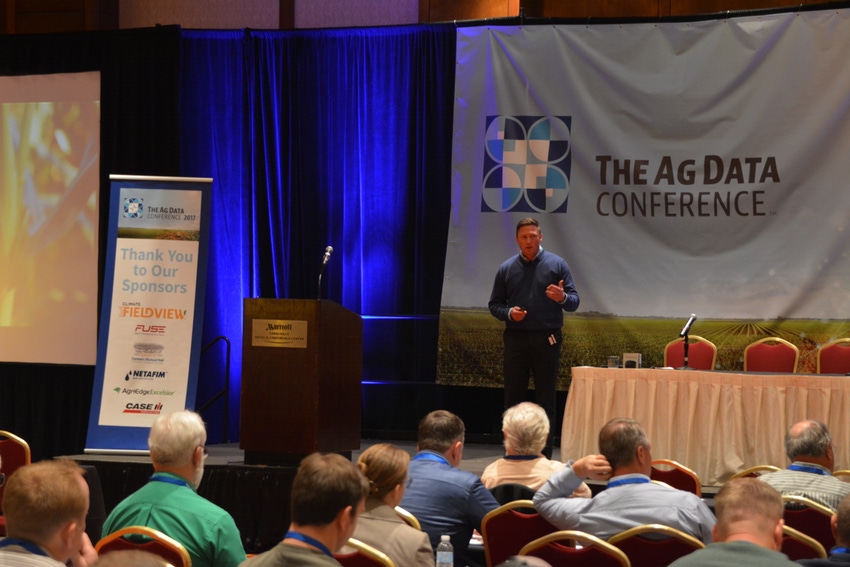December 6, 2017

It’s always fun being around farmers and data/tech advisors at our Ag Data Conference. Sharing advice and research to help farmers gain a competitive edge is the true value of any conference, and we witnessed a lot of that during our November 29-30 sessions near Iowa City, Iowa.
Here’s a quick overview of some key takeaways from the conference. More stories to come.
Corn&Soybean Digest editor Kurt Lawton launches The Ag Data Conference in Coralville, Iowa #AgData2017 pic.twitter.com/nCzORYTjG5
— Farm Futures (@FarmFutures) November 29, 2017
For starters, Ohio State University ag engineer John Fulton kicked off the conference by talking about building a digital strategy for your farm.
1. Ask these questions to build a strategy:
Questions to ask when planning a digital strategy for the farm. #agdata2017 pic.twitter.com/9XzhDArN97
— Corn-Soybean Digest (@csdigest) November 29, 2017
2. Before sharing data, ask these questions:
When sharing farm data, Fulton recommends asking yourself these questions. #agdata2017 pic.twitter.com/yiYRLDSg0U
— Corn-Soybean Digest (@csdigest) November 29, 2017
Dave Muth, founder of AgSolver, now VP of EFC Systems, discussed how to turn field variability into higher return per acre.
3. Unprofitable acres (2 to 3 million acres in Iowa alone) cause misallocated working capital.
4. Most farm fields have between 5 and 20% unprofitable acres. Muth says it’s easy to justify not farming these acres even on leased ground when the annual average loss is more than average cash flow.
Most farm fields include up to 20% unprofitable acres. AgSolver founder Dave Muth talks about how data drives better decisions #AgData2017 pic.twitter.com/Tg1rajiHDA
— Farm Futures (@FarmFutures) November 29, 2017
John Jansen, commercial lead for Climate Corp technology talked about how FieldView improves centralized field data management, helps uncover valuable field insights and optimizes seed and fertility inputs.
5. FieldView helped growers clearly see data that showed improved plant health and better yields where fungicides were applied.
Tom McGraw, founder of Midwest Independent Soil Samplers, talked about how the “flaw of averages” because no field is average.
6. Blanket fertilizing a field for average yield wastes input dollars because you over-fertilize 45% of the time and under-fertilize 45% of the time.
When sharing farm data, Fulton recommends asking yourself these questions. #agdata2017 pic.twitter.com/yiYRLDSg0U
— Corn-Soybean Digest (@csdigest) November 29, 2017
7. Mapping compaction in a field can save a lot of tillage costs. McGraw showed an 80-acre field that would cost $1,360 to rip the whole field, versus $238 to rip only the 14 acres that needed it.
Iowa farmer Scott Henry discussed their farm’s journey to make better decisions with data.
8. Study your data management options given your goals, needs, objectives, not what the software/service provides. What are you trying to get out of the solution?
When choosing data management options, do your due diligence up front, says Scott Henry, @LongViewFarms. Changing solutions frequently is a killer to operator buy-in and hurts efficiency and accuracy. #AgData2017
— Corn-Soybean Digest (@csdigest) November 29, 2017
9. Take advantage of anonymously aggregated data to gain benchmarking benefits. If we put our data into a system, I have no problem putting it out there to have it analyzed.
Take advantage of your data being anonymously aggregated. When data is collected the same way, there’s more value in benchmarking it, says Henry. #AgData2017
— Corn-Soybean Digest (@csdigest) November 29, 2017
Dan Frieberg, founder of Premier Crop Systems (and data columnist for Corn+Soybean Digest) talked about the value of field research and their Learning Blocks technology.
10. It’s important to treat each field area as an independent cost/revenue unit (think cow herd mentality). These field research blocks validate our recommendations as we examine seed varieties, herbicides, fertility rates and more.
Shannon Gomes, certified crop advisor, Cedar Basin Crop Consulting in northeast Iowa, talked about the value of data compiled by Farmers Business Network (FBN) and the tested nutrient tools by NutrientStar program. Highlights:
11. NutrientStar helps farmers and advisors make the right choice of nutrient management tools for greater productivity, profit and environmental outcome.
Chad Colby, founder of Colby AgTech, offered a look at 2018 ag technology.
12. Get started with remote sensing/satellite data and buy a drone – along with the latest iPad and iPhone to handle current programs and services.
When determining the level of tech to start with do two things: Get a trusted partner with remote sensing/satellite data and get a drone, says @TheChadColby. #AgData2017
— Corn-Soybean Digest (@csdigest) November 29, 2017
13. You’ve got to start pushing your limits because there are opportunities. As exciting as aerial imagery is, I’m more excited to learn about what’s coming from our soil in the future with in-field sensor data.
You’ve got to start pushing your limits because there are opportunities, says @TheChadColby at #AgData2017.
— Corn-Soybean Digest (@csdigest) November 29, 2017
14. Ask questions on social media, as you’ll get answers in this new coffee shop.
“For agriculture, social media is the new coffee shop. If you have questions, ask them. You’ll get answers.” @TheChadColby #AgData2017 pic.twitter.com/UrLsVo7b7V
— Farm Futures (@FarmFutures) November 29, 2017
15. Here’s your technology checklist for 2018:
Tech checklist for 2018 on your farm from @TheChadColby. #AgData2017 pic.twitter.com/lQwyylgE7n
— Corn-Soybean Digest (@csdigest) November 29, 2017
And the final main session speakers – Agren founder Tom Buman and Continuum Ag data/soil consultant Mitchell Hora – talked about how improving soil health delivers other benefits like water quality and quantity, soil conservation and more.
Agren founder Tom Buman and data consultant Mitchell Hora https://t.co/Hi8pLVZujy and farmers talk benefits of soil health #AgData2017 https://t.co/ogq9Dyce26 pic.twitter.com/QHL9VjAdM5
— Corn-Soybean Digest (@csdigest) November 30, 2017
About the Author(s)
You May Also Like






